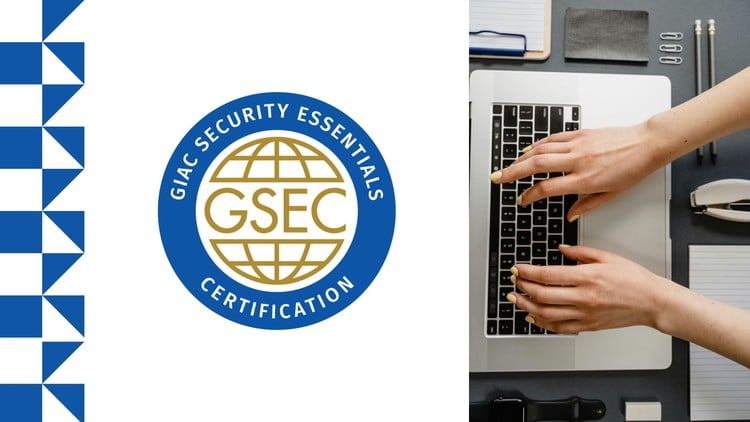
Master foundational cybersecurity skills and prepare for the globally recognized GIAC Security Essentials (GSEC) certifi
👥 11 students
Add-On Information:
Note➛ Make sure your 𝐔𝐝𝐞𝐦𝐲 cart has only this course you're going to enroll it now, Remove all other courses from the 𝐔𝐝𝐞𝐦𝐲 cart before Enrolling!
- Course Caption: Master foundational cybersecurity skills and prepare for the globally recognized GIAC Security Essentials (GSEC) certification.
-
Course Overview
- This comprehensive course is your definitive gateway into cybersecurity, meticulously designed to prepare you for the challenging yet highly rewarding GIAC Security Essentials (GSEC) certification exam. It fosters a deep understanding of core security principles and practical application. Whether you’re an IT professional pivoting to security, a system administrator hardening infrastructure, or a new entrant seeking a robust foundation, this program offers a holistic, vendor-neutral perspective on modern cybersecurity threats and defenses. We’ll explore critical components of secure systems, network protection, incident handling, and ethical considerations, ensuring you gain a well-rounded view of safeguarding digital assets. The curriculum builds knowledge progressively, from fundamental concepts to intricate defensive strategies, culminating in your readiness for the GSEC exam. This course isn’t just about passing an exam; it’s about building a career-long foundation in security.
-
Requirements / Prerequisites
- While this course provides foundational learning, a basic understanding of information technology concepts is highly beneficial.
- Familiarity with common operating systems (e.g., Windows, Linux), including navigating file systems and executing basic command-line operations, will greatly assist your learning.
- A fundamental grasp of networking principles, such as IP addresses, subnets, and common network protocols (e.g., HTTP, DNS), will also provide a strong starting point.
- No prior dedicated cybersecurity experience is strictly required, making it accessible to motivated individuals from various IT backgrounds.
- A keen interest in security and a willingness to engage with technical concepts are paramount for success.
-
Skills Covered / Tools Used
- Core Security Principles: Master foundational concepts like the CIA triad (Confidentiality, Integrity, Availability), access control, authentication, and defense-in-depth strategies.
- Network Security Fundamentals: Understand TCP/IP vulnerabilities, secure network communication, firewall principles, basic Intrusion Detection/Prevention Systems (IDS/IPS), Virtual Private Networks (VPNs), and wireless security.
- Operating System Hardening: Learn to secure both Windows and Linux environments, covering user and group management, file permissions, patch management, system auditing, and common OS-level vulnerability mitigation.
- Threat Vectors & Defensive Measures: Gain insights into common attack methodologies (e.g., reconnaissance, exploitation) and various malware types (e.g., ransomware, worms), along with effective anti-malware strategies.
- Vulnerability Management & Assessment: Acquire knowledge of identifying, assessing, and mitigating system vulnerabilities. Utilize basic scanning tools like Nmap for host discovery and port scanning, interpreting scan results for remediation.
- Cryptography Essentials: Explore the fundamentals of symmetric and asymmetric encryption, hashing functions, digital signatures, and Public Key Infrastructure (PKI), understanding their role in data protection.
- Incident Response Basics: Develop foundational knowledge in the incident response lifecycle, encompassing preparation, identification, containment, eradication, and recovery.
- Security Policies & Awareness: Learn about developing and implementing effective security policies, ensuring compliance, and fostering a strong security-aware organizational culture through training.
- Endpoint Protection & Cloud Security: Explore host-based firewalls, antivirus solutions, basic Data Loss Prevention (DLP) concepts, and security considerations in cloud computing (e.g., shared responsibility model) and virtualized environments.
- Practical Tools: Gain familiarity with essential tools like Wireshark for packet analysis and Nmap for network scanning and host discovery.
-
Benefits / Outcomes
- Globally Recognized Certification: Earn the highly esteemed GIAC Security Essentials (GSEC) certification, providing globally recognized validation of your foundational cybersecurity knowledge and practical skills.
- Comprehensive Foundational Skillset: Develop a broad and deep understanding across critical security domains, preparing you for diverse entry-to-mid level roles such as Security Analyst, IT Auditor, or System Administrator with enhanced security responsibilities.
- Accelerated Career Growth: Significantly enhance your employability and open doors to advanced career opportunities within the burgeoning cybersecurity industry.
- Immediate Practical Application: Acquire actionable insights and practical techniques for defending against real-world threats, enabling you to immediately contribute to securing systems and networks.
- Pathway to Advanced GIAC Certifications: Establish a robust knowledge base that serves as an excellent stepping stone for pursuing more specialized GIAC certifications.
- Increased Credibility & Confidence: Build self-assurance and professional credibility in your ability to understand, implement, and manage fundamental security controls and strategies.
-
PROS
- Holistic & Practical Curriculum: Offers a wide-ranging yet practical exploration of essential cybersecurity topics.
- Industry-Leading Recognition: GIAC certifications are among the most respected and sought-after in the cybersecurity field.
- Vendor-Neutral Approach: Focuses on universal security principles applicable across various technologies and platforms.
- Strong Career Foundation: Provides an excellent entry point or enhancement for a cybersecurity career.
- Hands-On Learning: Incorporates practical exercises and tool usage to solidify understanding.
-
CONS
- Demanding Pace for Novices: The extensive breadth and depth of topics can be challenging for individuals with minimal prior IT or security exposure.
Learning Tracks: English,IT & Software,IT Certifications
Found It Free? Share It Fast!